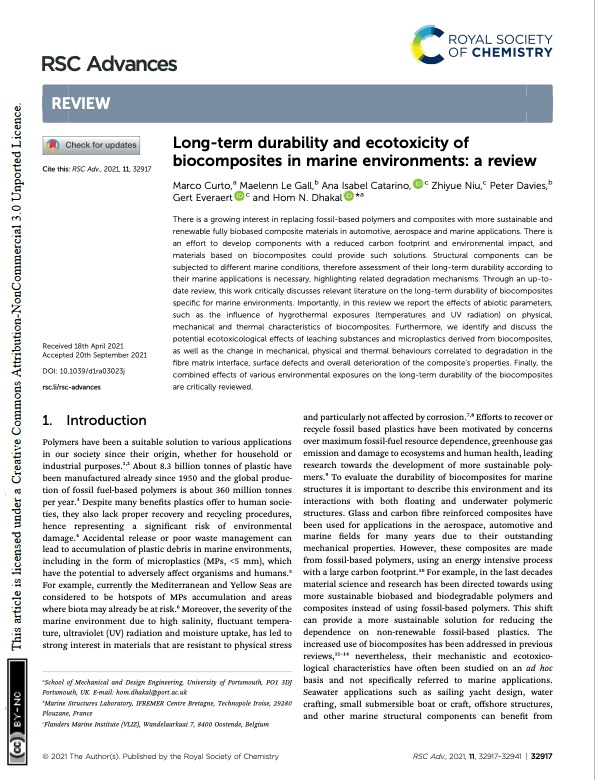
PDF Publication Title:
Text from PDF Page: 001
RSC Advances REVIEW Cite this: RSC Adv., 2021, 11, 32917 Long-term durability and ecotoxicity of biocomposites in marine environments: a review Marco Curto,a Maelenn Le Gall,b Ana Isabel Catarino, c Zhiyue Niu,c Peter Davies,b Gert Everaert c and Hom N. Dhakal *a There is a growing interest in replacing fossil-based polymers and composites with more sustainable and renewable fully biobased composite materials in automotive, aerospace and marine applications. There is an effort to develop components with a reduced carbon footprint and environmental impact, and materials based on biocomposites could provide such solutions. Structural components can be subjected to different marine conditions, therefore assessment of their long-term durability according to their marine applications is necessary, highlighting related degradation mechanisms. Through an up-to- date review, this work critically discusses relevant literature on the long-term durability of biocomposites specific for marine environments. Importantly, in this review we report the effects of abiotic parameters, such as the influence of hygrothermal exposures (temperatures and UV radiation) on physical, mechanical and thermal characteristics of biocomposites. Furthermore, we identify and discuss the potential ecotoxicological effects of leaching substances and microplastics derived from biocomposites, as well as the change in mechanical, physical and thermal behaviours correlated to degradation in the fibre matrix interface, surface defects and overall deterioration of the composite's properties. Finally, the combined effects of various environmental exposures on the long-term durability of the biocomposites are critically reviewed. Received 18th April 2021 Accepted 20th September 2021 DOI: 10.1039/d1ra03023j rsc.li/rsc-advances 1. Introduction Polymers have been a suitable solution to various applications in our society since their origin, whether for household or industrial purposes.1,2 About 8.3 billion tonnes of plastic have been manufactured already since 1950 and the global produc- tion of fossil fuel-based polymers is about 360 million tonnes per year.3 Despite many benets plastics offer to human socie- ties, they also lack proper recovery and recycling procedures, hence representing a signicant risk of environmental damage.4 Accidental release or poor waste management can lead to accumulation of plastic debris in marine environments, including in the form of microplastics (MPs, <5 mm), which have the potential to adversely affect organisms and humans.5 For example, currently the Mediterranean and Yellow Seas are considered to be hotspots of MPs accumulation and areas where biota may already be at risk.6 Moreover, the severity of the marine environment due to high salinity, uctuant tempera- ture, ultraviolet (UV) radiation and moisture uptake, has led to strong interest in materials that are resistant to physical stress aSchool of Mechanical and Design Engineering, University of Portsmouth, PO1 3DJ Portsmouth, UK. E-mail: hom.dhakal@port.ac.uk bMarine Structures Laboratory, IFREMER Centre Bretagne, Technopole Iroise, 29280 Plouzane, France cFlanders Marine Institute (VLIZ), Wandelaarkaai 7, 8400 Oostende, Belgium and particularly not affected by corrosion.7,8 Efforts to recover or recycle fossil based plastics have been motivated by concerns over maximum fossil-fuel resource dependence, greenhouse gas emission and damage to ecosystems and human health, leading research towards the development of more sustainable poly- mers.9 To evaluate the durability of biocomposites for marine structures it is important to describe this environment and its interactions with both oating and underwater polymeric structures. Glass and carbon bre reinforced composites have been used for applications in the aerospace, automotive and marine elds for many years due to their outstanding mechanical properties. However, these composites are made from fossil-based polymers, using an energy intensive process with a large carbon footprint.10 For example, in the last decades material science and research has been directed towards using more sustainable biobased and biodegradable polymers and composites instead of using fossil-based polymers. This shi can provide a more sustainable solution for reducing the dependence on non-renewable fossil-based plastics. The increased use of biocomposites has been addressed in previous reviews,11–14 nevertheless, their mechanistic and ecotoxico- logical characteristics have oen been studied on an ad hoc basis and not specically referred to marine applications. Seawater applications such as sailing yacht design, water craing, small submersible boat or cra, offshore structures, and other marine structural components can benet from © 2021 The Author(s). Published by the Royal Society of Chemistry RSC Adv., 2021, 11, 32917–32941 | 32917PDF Image | Long-term durability and ecotoxicity of biocomposites in marine environments

PDF Search Title:
Long-term durability and ecotoxicity of biocomposites in marine environmentsOriginal File Name Searched:
RA-011-D1RA03023J.pdfDIY PDF Search: Google It | Yahoo | Bing
Development of a solar powered Electric Ship The Electricship website originally started off as a project to develop a comprehensive renewable, affordable, modular electric ship... More Info
Modular Boat Hull Composite The case for a unsinkable, modular composite hybrid boat hull... More Info
MS Burgenstock Hybrid Electric Catamaran Lake Lucerne Unique shuttle servicing Lucerne to the Burgenstock Resort... More Info
Ground Power Unit GPU Powered by Lithium Ion Batteries The goal of the Ground Power Unit is to provide a readily accessible, modular, ready-to-power solution for remote power... More Info
| CONTACT TEL: 608-238-6001 Email: greg@electricship.com | RSS | AMP |